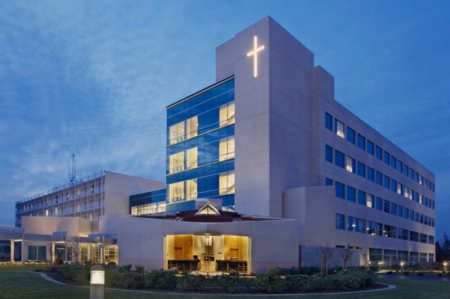Supreme Court rejects Catholic hospital sued for refusing to perform hysterectomy on trans patient

The U.S. Supreme Court has declined to take up a case involving a Catholic hospital in California that is being sued for refusing to perform a hysterectomy on a trans-identified patient.
In a list of orders published Monday, the Supreme Court denied “the petition for a writ of certiorari” in the case of Dignity Health v. Minton, Evan. Conservative Justices Clarence Thomas, Samuel Alito and Neal Gorsuch would have granted the appeal.
The case goes back to state court for further proceedings as the high court's decision lets stand an appellate court ruling allowing the plaintiff to proceed with a lawsuit against the hospital.
The lawsuit was filed in April 2017, one year after Mercy San Juan Medical Center in the Sacramento suburb of Carmichael, California, refused to perform a hysterectomy on Evan Minton, a trans-identified female.
The hospital, one of six medical centers operated by its parent company, Dignity Health, concluded that performing the procedure would violate the ethical and religious directives for Catholic Health Care Services.
The directives document was published by the U.S. Conference of Catholic Bishops and features guidance for “institutionally based Catholic health care services.”
The directives assert that “direct sterilization of either men or women, whether permanent or temporary, is not permitted in a Catholic health care institution.” However, the directives permit Catholic hospitals and healthcare providers to perform “procedures that induce sterility” if “their direct effect is the cure or alleviation of a present and serious pathology and a simpler treatment is not available.”
The original lawsuit filed argued that the refusal to perform Minton’s hysterectomy "constitutes discrimination" based on gender identity. Although the Catholic hospital refused to perform the procedure, Minton secured a hysterectomy at another Dignity Health-affiliated hospital 30 miles away four days after the scheduled hysterectomy was canceled.
The Mercy San Juan initially agreed to perform the hysterectomy, a procedure commonly done for medical reasons, until finding out that the hysterectomy was part of a gender transition process, not an effort to alleviate a “present and serious pathology.”
The hospital then informed the doctor scheduled to perform the hysterectomy that she could not do so. Minton learned that the hysterectomy was canceled the day before the procedure was set to take place, a development that resulted in “great anxiety and grief.”
While a judge at the federal district court level sided with Mercy San Juan Medical Center, an appellate court ruled in September 2019 that “Dignity Health discriminated against Minton” in violation of California civil rights law. The appellate court’s decision sent the case back to the California Supreme Court for San Francisco County “to enter a new and different order.”
In a petition for a writ of certiorari filed in March 2020, the hospital asked the Supreme Court to reverse the lower court decision. The petition warns that “this case poses a profound threat to faith-based health care institutions’ ability to advance their healing ministries consistent with the teachings of their faith.”
Minton took to Twitter to cheer the Supreme Court’s refusal to hear the appeal.
“For the first time in a year, I can feel my heart start to relax,” Minton stressed. “At times today, I danced. I notoriously never celebrate ‘the moments,’ so this was huge.”
“In closing, the fight for justice can be long, it can be arduous, the future will always be (and is) uncertain, but the fight so far has been worth every tear and drop of sweat.”
Hi folks,
— Evan Minton t(he)y (@EvanMMinton) November 2, 2021
It's been a busy day and things are still sinking in. I'm really trying to summarize how I feel, but it's hard. How to summarize a year of intense stress and nights where time seemed to stand still? Impossible.
First, I just want to say thathttps://t.co/waAcErPiQj
While the nation’s high court declined to hear the case, the justices issued a decision in another case Monday that is favorable to Catholic nuns and other Christian employers seeking exemption from a New York state law requiring employer-sponsored healthcare plans to cover the cost of abortions.
The court vacated a lower court decision against religious groups and remanded the case back to the New York State Supreme Court’s Appellate Division in light of its ruling in Fulton v. City of Philadelphia. The June ruling found that the city of Philadelphia could not exclude a Catholic charity from its foster program because the organization upholds policies that don't allow children to be placed with same-sex couples.
The debate about whether or not faith-based organizations should be forced to take actions that violate their religious convictions has intensified in recent years as Congress has debated the Equality Act, which would codify nondiscrimination protections for the LGBT community into federal law.
Critics of the legislation warn of its implications for religious liberty, specifically that it could force religious organizations to fund abortion healthcare coverage and violate their beliefs about gender, marriage and sexuality.
The bill has passed the Democrat-controlled U.S. House of Representatives but stalled in the evenly divided Senate because of opposition from both Democrats and Republicans.
Ryan Foley is a reporter for The Christian Post. He can be reached at: ryan.foley@christianpost.com





















